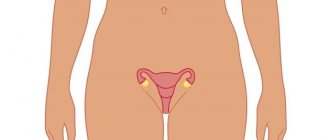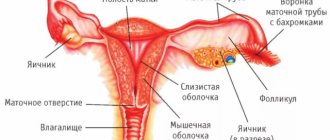The uterus, the main organ of the female reproductive system, is connected to the external environment through the vagina, and air enters it through it. Active body movements increase the volume of air mass penetrating into this intimate zone, and at a certain moment the reverse process occurs - the cavity is emptied.
The air does not always come out silently, which makes women feel complex. It is especially unpleasant if this happens during intimacy. Is there really no way to stop the release of air from the uterus and make the process manageable?
Treatment of prolapse and loss of internal genital organs
If the defects of the supporting structures are minor and the internal genital organs do not fall below the plane of the vaginal opening when straining (usually there are no complaints), treatment is not carried out.
The exception is patients with stress urinary incontinence who are scheduled for surgical treatment. In other cases, the treatment tactics for prolapse and prolapse of the internal genital organs are determined individually. It can be conservative (use of uterine rings made of synthetic material) or surgical. Uterine rings are installed in the vagina if there are contraindications for surgical treatment (for example, concomitant somatic pathology of various organs and systems - heart, lungs, kidneys, etc., elderly patient). They can be silicone and remain in the vagina for several months. Other uterine rings, which are often made of rubber, should be removed by patients at night to prevent bedsores (death of tissue as a result of constant pressure of the ring on the vaginal walls). After selecting the uterine ring, the patient is taught to insert and remove it independently. The frequency of examination of such patients is determined individually, usually the first examination is carried out after a week, and then, in the absence of complaints, every 4-6 months.
If the defects of the supporting structures are minor, no treatment is performed.
A radical solution to the problem of genital prolapse is surgical treatment. The purpose of the operation is to permanently eliminate all defects in the supporting structures. Many operations have been developed to pursue this goal. Typically these operations are performed through the vagina.
Hysteropexy (fixation of the uterus to something) is performed for women planning to have children in the future, if conservative treatment is ineffective. The best treatment results are obtained by fixing the uterus to the anterior longitudinal ligament of the sacrum, and the uterosacral ligaments are sutured to the sacrum not directly, but using a synthetic mesh or a section of fascia.
If the vaginal walls prolapse, colporrhaphy and perineoplasty are performed - an operation that consists of excision of “excess tissue” and strengthening of the perineal muscles by suturing their legs. Women who have undergone colporrhaphy undergo a cesarean section in the event of a subsequent pregnancy.
If a woman has urinary incontinence, without genital prolapse, then a method such as plastic surgery with a free synthetic loop - TVT/TVT-O - can be used. The intervention eliminates an unpleasant symptom (urinary incontinence), but does not eliminate prolapse of the vaginal walls. The operation lasts 20-30 minutes under local anesthesia. During this operation, the doctor passes a special tape made of synthetic polypropylene material under the urethra through three small incisions in the suprapubic area. The tape supports the urethra and prevents involuntary urination when intra-abdominal pressure increases. The surgeon checks the effectiveness of the intervention directly during the operation. The patient is asked to perform several coughing movements, and if no urine leakage occurs, then the operation is completed. If necessary, the doctor changes the tension of the loop.
In cases of complete uterine prolapse in old age, vaginal hysterectomy is performed (i.e. complete removal of the uterus through the vagina). During this operation, anterior or posterior vaginal plastic surgery, correction of intestinal hernia, etc. can be performed simultaneously from the same access.
How to deal with this?
To prevent the uterus from making sounds during sexual intercourse, you can change positions, the angle of inclination and the time the penis is inside. It may be possible to determine that the air leaves the uterus silently.
If obscene sounds are produced, and the woman is embarrassed because of this, she can do the following: before sexual intercourse, lie on her back and press her palm on her lower abdomen. This is how the air that has already appeared leaves the dilated vagina.
But even if he is not going to quietly leave the uterus, you can fix this if you do the exercise. A vagina whose tone is improved by training, the air comes out quietly.
The muscle will become stronger thanks to the following exercises:
- An exercise that can be done even in public places without anyone noticing. It is necessary to alternately squeeze the vagina and anus.
- Train the vagina by squeezing it during urination, alternating with relaxation.
- Slow squats with wide legs. This is a very useful exercise that allows the air to escape.
A woman who regularly exercises her vagina will be able to control the release of gas. During Kegel exercises, many people may try to cheat by using their abdominal or thigh muscles. Because of this, training can cause fatigue, which should not be the case. The intimate area is the only thing that should be tense.
In addition to the obvious bonuses like eliminating farts, improving muscle tone, you can also mention improving the quality of sexual intercourse with a partner and experiencing more intense sensations. The uterus also has a great influence on childbirth. Air comes out of the vagina due to relaxation and softening of the muscles. And a muscle that is more developed can make labor easier and speed it up, by pushing the baby out faster and stronger. The end of childbirth means that the uterus will also push out pieces of the placenta and umbilical cord.
Useful video:
Statistics show that childbirth helps those who have not experienced it before achieve orgasm. This is due to the fact that the uterus craves exercise, which the woman is obliged to perform as prescribed by the doctor after the birth of the baby. And by strengthening the muscles, completely different sensations are achieved.
Childbirth the second time is much less painful than the first. 73% of the fair sex think so.
Exercises
Excellent exercise for muscles and insurance against burping air. It is enough for a woman to learn to breathe correctly, work with the anus and vagina without involving the press. You can increase the effectiveness of the complex using special means, for example, vaginal balls.
Regular performance of vumbilding solves the problem of vaginal flatulence and improves sex life.
If air gets inside your body, simple squats will help get rid of it. This will help build muscle mass in your buttocks and strengthen your pelvic floor. But it is important to do the exercise correctly:
- starting position: feet shoulder-width apart;
- socks are spread in different directions;
- take your time to sit down.
Train slowly, taking short breaks.
The muscles of the perineum should be squeezed and held for several seconds. Then quickly pull them in or push them out. The exercises can be done comfortably in a lying position.
A simple way to fix the problem is Pilates. It is performed slowly and without sudden movements. This is how the deep muscles are worked out well. Pilates exercises the pelvis, stomach and back. If you are doing this for the first time, it is advisable to start with a simple set of exercises.
Gymnastics for intimate muscles
Many women are embarrassed to do Kegel exercises; they find them shameful.
Don’t break yourself - there are simple movements that help strengthen your intimate muscles:
- regular squats performed with hips spread - it is advisable to turn your knees to the sides during movements;
- interruption of the act of urination for a few seconds;
- tension in the vaginal muscles when you sit on a chair, completely relaxed.
Special Kegel exercises also consist of a complex during which the vaginal muscles are tensed and relaxed in various positions - standing, sitting or lying down.
In a lying position, the action should resemble pushing - that is, you need to try to control the intimate muscles in the complex - the vagina and uterus. At the same time, the abdominal press also tenses and relaxes, which is very useful. During the first sessions, you can help with your hands - with a little pressure on the uterus, the air will leave the body completely.
If this exercise is regularly performed before sexual intercourse, embarrassment can be avoided in the future.
Training the intimate muscles of the perineum with the help of weights is not Kegel gymnastics, but wumbling. This technique helps control the intimate muscles almost completely.
General recommendations
The following measures will help reduce the frequency and intensity of air discharge from the uterus:
- using special lubricant during sexual intercourse;
- avoiding sexual positions that allow air to enter the vagina;
- timely treatment of genitourinary diseases;
- strengthening the pelvic muscles with special exercises.
Various exercises help maintain organ functionality:
- Kegel exercise.
- Daily deep squats with the knees raised to the sides. You need to do 10-15 squats a day.
- Stimulate the elasticity of the vagina during sexual intercourse. To do this, the woman needs to tense her vagina and try to push the phallus out.
Cases where air leaves the uterus after childbirth are definitely not discussed at women’s gatherings. And not every woman can voice such a problem at a doctor’s appointment. Ultimately, many are left alone with their own physiology.
Moreover, air often leaves the uterus at the most inopportune moment, in particular during intimacy with a partner. It's not surprising that this can throw off the entire romantic mood. So what are the reasons for such a delicate issue?
Anatomical causes of the phenomenon
The vagina is a hollow organ that can allow air from the environment or the gastrointestinal tract to enter if there is an abnormality such as a fistula. This is the opening that connects the vagina to the rectum. The defect can be either congenital or acquired as a result of surgery, an inflammatory process, etc.
Unlike the rectum, which is similar in structure, the vagina does not have a sphincter that can control and prevent gas from entering and leaving it. At the moment when the internal muscles of the organ are compressed, air can be spontaneously released, accompanied by a characteristic sound.
According to tomographic studies, the appearance of air in the vagina in most women is not accompanied by any additional pathologies. The process of spontaneous release of gas from the vagina is medically called vaginal flatulence.
You can expect this phenomenon at any time, but in most cases, gases come out of the vagina under the following circumstances:
- during sexual intercourse or after completion of sexual intercourse;
- after the end of labor;
- during the premenstrual period;
- when performing physical exercises;
- while going up or down stairs.
The escaping gases are not pathological and are not accompanied by an unpleasant odor. Therefore, this manifestation of the female body does not require treatment. But in order to avoid unpleasant moments, for example, if vaginal flatulence occurs in a public place, you can familiarize yourself with corrective therapy.
Air from the uterus - what causes it, when does it appear?
Vaginal flatulence manifests itself in various situations and conditions. The reasons are the following factors.
Sex
Most often, the vagina makes unwanted sounds when intercourse is performed in the doggy position. Air comes out during sexual intercourse because the part of the vagina that is located near the cervix expands. This happens in order to accommodate as many germ cells as possible. Also, during sex, gases come out of the uterus due to spasms of its muscles, or when the male genital organ scurries back and forth at too high a speed. To avoid vaginal flatulence, before starting sexual intercourse, you just need to lightly press your palm on the lower abdomen. This will free the vagina from excess air.
Pregnancy period
When a woman is pregnant, her genitals are more intensely supplied with blood. Therefore, the vagina seems to swell slightly during this period. During pregnancy, it is more difficult for air to escape from the uterus, and obscene sounds appear.
Postpartum period
During childbirth, the vagina and cervix dilate greatly so that nothing prevents the baby from being born. As a result, the vaginal walls become flabby, allowing more air to enter. This happens especially often if a woman gives birth after 30. Air often leaves the uterus after childbirth in those who give birth to twins or more babies.
Days before menstruation
During this period, air enters the vagina because the tone in the pelvic muscles decreases and the cervix increases. The vagina begins to “give voice” even when a woman simply gets up from a chair or bed, squats or pumps her abs. The causes of the phenomenon are the physiological characteristics of the body.
Aging and menopause
As a woman ages, the amount of the female sex hormone estrogen in her body decreases, the vaginal muscles become flabby, and more and more air gets into it.
There may also be a lot of air in the uterus due to:
- repeated miscarriages or abortions;
- chronic constipation and intestinal obstruction;
- heavy physical work with heavy loads on the small pelvis;
- cystitis and other serious bladder problems;
- “shift” or prolapse of the uterus, uterine hernia.
Preventing air from entering the vagina
Squats, particularly while urinating, help release air that has become trapped in the vagina.
In many cases, there are no effective methods to prevent the formation of vaginal gas, but it must be recognized that women usually do not need this. Typically, the only symptoms of this condition are the sound and sensation of trapped air leaving the vagina. Usually this is not associated with pain or discomfort, but perhaps with a feeling of embarrassment.
If vaginal gas does not leave the body naturally, you can release it by squatting, especially while urinating. When gas has caused muscle tension, a woman will be helped by relaxation and deep breathing.
If vaginal gas becomes a serious problem, a woman may want to avoid sexual activities and exercises that are causing the problem. The risk of air entering the vagina can also be reduced by not using tampons.
Although cesarean sections and pelvic surgeries are associated with an increased risk of vaginal gas, a 2012 study published by the National Center for Biotechnology Information (NCBI) found that most women experience vaginal gas after natural childbirth.
A small study, which is not yet backed by direct evidence (the results were published by the US National Research Center in 2003), suggested that using a pessary helps reduce the likelihood of air pockets in the vagina. A pessary is a round device that is placed inside the vagina to support the tissue affected by pelvic organ prolapse.
Kegel exercises, which are performed to strengthen the pelvic floor muscles, can also reduce the likelihood of air getting into the vagina.
Why does air leave the uterus after childbirth?
Experts pay attention to the fact that air comes out of the vagina, and not from the uterus itself. Moreover, the main reason for this phenomenon is the entry of air into the vagina, no matter how strange it may sound
This happens, for example, while cycling, running or walking, as well as during any active movements. Then the air leaves the uterus with a characteristic sound.
One way or another, all representatives of the fair sex should understand that the most common reason for air entering the uterus is sexual intercourse. Moreover, during traditional sex, the likelihood of air being forced into the vagina is especially high, because during stimulation of its walls, its walls are stretched, and the piston acts as a kind of “piston”. Therefore, if air comes out of the vagina after sexual intercourse, then this is a natural phenomenon in which there is nothing strange.
If air leaves the uterus during intimacy, this causes the woman to feel discomfort. But the real problem appears when this happens during simple bending, getting up from the sofa, coughing, etc. How, in this case, can we explain the true cause of the sound coming from the woman? One way or another, the reason that air leaves the uterus after childbirth lies in the overstretching of the vaginal walls, as well as the muscles of the perineum.
It is recent childbirth that is the main cause of loss of tone in the pelvic floor muscles. That is, everything is explained by the weakness of the ligamentous apparatus in the uterus with a weakening of the tone of the perineal muscles.
Vaginal fistulas (fistulas) and gases
Fistulas or fistulas occur when abnormal openings develop between two organs that should not anatomically be connected to each other. In particular, they can occur at times when scar tissue forms or disappears. Vaginal fistulas can cause vaginal gas.
Fistulas can develop between the vagina and other pelvic organs. The symptoms associated with fistulas depend on their size, location, and the organs affected.
Possible types of vaginal or vaginal fistulas include the following.
Vesicovaginal fistula
Vesicovaginal fistula (vesicovaginal fistula) is characterized by the development of communication between the vagina and the bladder.
At least three million women in developing countries have unresolved vesicovaginal fistulas. This condition is usually associated with complicated childbirth and injuries received during gynecological operations.
In developed countries, vesicovaginal fistulas are less common, although they still occur in 3-5% of cases of cancer of the vagina, cervix and uterus (endometrium).
The most common symptoms of vesicovaginal fistulas are abnormal watery discharge and regular urine leakage. Large fistulas can cause pain and discomfort.
Uretero-vaginal fistula
A ureterovaginal fistula (uretero-vaginal fistula) occurs when a connection develops between the vagina and the ureter, a tubular structure that is usually located on both sides of the body and connects both kidneys to the bladder to further remove urine from the body.
Most uretero-vaginal fistulas result from injuries sustained during gynecological surgery, such as hysterectomy.
The most common symptoms of ureterovaginal fistulas are urine leakage from the vagina and abdominal discomfort.
Urethrovaginal fistula
A urethrovaginal fistula (urethrovaginal fistula) results from the development of an opening between the vagina and the urethra (urethra), a tube-like structure that connects the bladder to the outside of the body.
The most common symptom of a urethrovaginal fistula is regular leakage of urine from the vagina, which increases with pressure on the abdominal cavity.
Enterovaginal fistula
An enterovaginal fistula (colovaginal or enterovaginal fistula) develops when an abnormal communication forms between the vagina and the small intestine.
This condition may result from abdominal and pelvic surgery or inflammatory bowel disease (IBD) such as Crohn's disease.
Symptoms of enterovaginal fistulas include abdominal pain and gas passing through the vagina.
Rectovaginal fistula
A rectovaginal fistula (rectovaginal fistula) forms when an abnormal connection between the vagina and rectum develops.
This condition can have several causes, including:
- inflammatory bowel diseases, such as Crohn's disease or ulcerative colitis;
- prolonged or difficult labor;
- injuries during surgical procedures or postoperative complications such as infections;
- radiation (radiation) therapy of the pelvic organs;
- cancerous tumors.
The most common symptoms of a rectovaginal fistula are inflammation, gas or feces passing through the vagina, and a foul odor.
Colovaginal fistula
Colovaginal fistula (colic-vaginal fistula) is characterized by the development of an opening between the vagina and the colon.
This condition is rare and usually results from complications following pelvic surgery, including hysterectomy. Colovaginal fistula can also occur due to gastrointestinal diseases such as diverticulitis, Crohn's disease or ulcerative colitis.
The most common symptoms of a covaginal fistula include:
- passage or leakage of gas or feces through the vagina;
- foul-smelling vaginal discharge that may not be colored;
- numerous recurrent infections of the vagina and urinary tract;
- pain and inflammation in the area between the vagina, colon, and outer vaginal tissues during sexual activity.
Muscle tension
Certain types of activity, such as sex or, can cause tension in the pelvic muscles, which in turn contributes to air retention in the vaginal cavity.
Coughing and exercise can also tighten the pelvic muscles, pushing air in and out of the vagina.
Stretch marks
Certain types of exercises that involve stretching the pelvic area (such as yoga) often cause the vagina to open and relax, allowing significant amounts of air to enter.
When posture or body position changes, trapped air may suddenly be released.
A gynecological examination, in particular the insertion of speculum into the vagina, as well as other medical procedures can create conditions for air to enter the vagina.
This air may escape when the doctor removes the speculum and completes the test.
When should you see a doctor?
You should see a doctor if gas forms in the vagina for no obvious reason and is accompanied by other symptoms such as inflammation or bleeding
In rare cases, gas in the vagina may indicate serious illnesses that require the attention of a doctor. A fistula between the vagina and any other organ of the pelvic or abdominal cavity is a condition that requires the attention of medical professionals.
A woman should talk to her doctor if gas in the vagina begins to appear immediately after:
- the birth of a child, especially if the labor was long and/or difficult;
- radiation (radiation) therapy of the pelvic organs;
- gynecological surgery, as well as pelvic and abdominal surgery.
It is necessary to go to the hospital even when, along with gases, a woman observes the following in the vagina:
- pain or discomfort;
- urine leakage or increased vaginal discharge;
- feces or other waste;
- unpleasant odor;
- blood;
- inflammation or swelling of the vaginal tissues.
You should also seek medical attention if your vaginal gas discharge increases during the day and is not associated with activities that may trigger the condition, such as sex or stretching.
Deviation from the norm
It happens that a woman complains of unpleasant symptoms. To prevent them from developing into complications and requiring treatment, you need to know what to do and how to deal with them.
Signals indicating deviation
- Decreased sensitivity. This is a temporary factor, do not panic. It is acceptable that a woman may completely lose sensitivity for some time. The walls of the vagina lose elasticity, and recovery takes time.
- Pain. Often women complain of discomfort. Moreover, after childbirth, everyone’s vagina hurts with varying degrees of severity. The reason is stretching and tearing of the perineum, which are subsequently sutures. Painful sensations arise precisely in the area of suturing, since nerve endings are often affected. Over time, the discomfort ceases to bother you.
- Dryness. Some women complain of vaginal dryness after childbirth. This occurs due to decreased estrogen levels and usually affects breastfeeding mothers. Over time, the dryness goes away, but until then you can use water-based intimate lubricants or special gels to moisturize the vagina. It is advisable not to choose oil-based products, as they create a poorly permeable film.
- Itching. This is a symptom that requires you to see a doctor. The cause may be an allergic reaction to the suture material or antiseptic used during childbirth. The problem should not be solved without a specialist - only he can choose the right treatment. Douching is usually prescribed.
- A rotten smell from the vagina after childbirth is evidence of inflammation or suppuration of the suture. Self-medication is strictly prohibited - consultation with a specialist and treatment with medications are required.
- Omission. Sometimes the pelvic floor muscles are so weakened that they cannot support the organs. Omission occurs, which has different stages. The first is partial prolapse, when its walls descend without leaving the vagina. The second is protrusion outward. The third is prolapse, in which case surgical intervention is necessary.
- Discharge. After birth, they look like mucus mixed with blood - the so-called lochia. At first they look like menstrual flow, and then the intensity decreases. Two months after birth, lochia should finally stop. Otherwise, you need to consult a doctor immediately.
How to avoid vaginal farts
If a woman experiences psychological discomfort from vaginal flatulence, or her man feels awkward in such situations, it is necessary to pump up the intimate muscles. There are several very effective exercises to give them proper tone:
- During normal urination, you can try to stop peeing two or three times by holding the flow of urine with your vaginal muscles. This trick should be done regularly, preferably every time you go to the toilet.
- Hold something heavy between your thighs and walk like this for 5-10 minutes. When performing this simple exercise several times a day, the muscles of the pelvic organs will noticeably tighten, which will make it difficult for air to enter the vagina and subsequent embarrassing “farts” from it.
You can solve the question of why air comes out of the vagina using organizational methods. To eliminate sounds from the uterus during sexual play, you need to choose a comfortable position and angle of entry of the penis into the vagina so that air leaves the vagina without noise. For example, positions where a woman lies upside down or bends over are not recommended (including the favorite styles of “doggy style” and “inverted wheelbarrow”), it is advisable to give preference to the good old missionary position, “cowgirl” or “spoon”, since In this position, practically no air enters the vagina.
Don’t discount the famous Kegel exercise – periodically tensing the muscles of the intimate area. However, it is necessary to ensure that it is the vaginal muscles that are tensed, and not the stomach or thighs, otherwise, instead of a pleasant tone, we will get fatigue and aching muscles.
Moms have a problem when air forms in the vagina after childbirth. Due to unpleasant sounds, complexes develop and problems arise in personal life. The phenomenon occurs involuntarily, and the process itself is considered a physiological deviation without pathologies.
The vagina is a hollow organ that contains a certain amount of air. If its exit is accompanied by vaginal farting after childbirth, this happens during sexual intercourse, when the size of the penis is less than the volume of the woman’s organs. Frequent changes of posture, especially in the elbow version, lead to this phenomenon.
Why does air leave the uterus after childbirth:
- active sexual contact;
- decreased tone;
- before the onset of menstruation;
- increased physical activity.
During the process of carrying a baby, the muscles of the uterus stretch and fill with air. After childbirth, a woman notices involuntary urination, feels air leaving the uterus after childbirth during sexual intercourse, while doing yoga, or sports. The sensation intensifies with sneezing and coughing.
It is intimacy that is considered one of the reasons for the appearance of deviation. When aroused, the walls stretch and air comes out of the vagina. If the problem occurs when you suddenly get up from the couch or cough, it means that the muscles of the perineum are stretched. After childbirth, a woman loses the tone of her pelvic floor.
Vaginal flatulence is affected by the structure of the organ. If the cervix is short and wide, more air gets in, which is subsequently expelled. When the penis is not voluminous enough, the phenomenon occurs when the tone of the woman’s genital organ decreases.
A physiological condition is considered a pathology when the presence of a rectovaginal fistula is confirmed. Before deciding to take measures to get rid of the problem, you need to consult a doctor and undergo a gynecological examination.
Why does air leave the uterus after childbirth?
Experts pay attention to the fact that air comes out of the vagina, and not from the uterus itself. Moreover, the main reason for this phenomenon is the entry of air into the vagina, no matter how strange it may sound
This happens, for example, while cycling, running or walking, as well as during any active movements. Then the air leaves the uterus with a characteristic sound.
One way or another, all representatives of the fair sex should understand that the most common reason for air entering the uterus is sexual intercourse. Moreover, during traditional sex, the likelihood of air being forced into the vagina is especially high, because during stimulation of its walls, its walls are stretched, and the piston acts as a kind of “piston”. Therefore, if air comes out of the vagina after sexual intercourse, then this is a natural phenomenon in which there is nothing strange.
If air leaves the uterus during intimacy, this causes the woman to feel discomfort. But the real problem appears when this happens during simple bending, getting up from the sofa, coughing, etc. How, in this case, can we explain the true cause of the sound coming from the woman? One way or another, the reason that air leaves the uterus after childbirth lies in the overstretching of the vaginal walls, as well as the muscles of the perineum.
It is recent childbirth that is the main cause of loss of tone in the pelvic floor muscles. That is, everything is explained by the weakness of the ligamentous apparatus in the uterus with a weakening of the tone of the perineal muscles.
Stages of descent
To many of us, this seems like the highest degree of injustice: when giving life to a new little man, a woman is sometimes forced to pay a rather high price. Of course, compared to the happiness received in return, it does not seem so high. But why did the prolapse of the uterus after childbirth affect me specifically? After all, not everyone faces such trouble...
In fact, uterine prolapse after childbirth is quite common (the number of cases increases with age) and has its own physiological causes:
- injuries and ruptures during childbirth;
- heavy physical labor in the postpartum period;
- weakness of the abdominal muscles;
- violation of the natural position of the uterus;
- excessive stretching of the ligaments holding the uterus;
- congenital connective tissue deficiency.
The development of prolapse is provoked by a sharp decrease in estrogen in a woman’s blood, which is observed during the postmenopausal period. Stretching and weakening of the pelvic muscles is facilitated by repeated and difficult childbirth, carrying a large fetus or several children (multiple pregnancy), as well as chronic inflammatory processes in the pelvic organs, which are accompanied by deterioration of blood circulation in the tissues, including muscles and ligaments.
In the later stages of the disease, a woman feels discomfort and difficulty walking. When the cervix begins to fall out, it seems as if there is something in the perineal area that is in the way or something extra (like a foreign body).
Uterine prolapse of any degree, even at a very early stage, can be diagnosed by a gynecologist during an examination.
Prolapse of the uterus after childbirth causes a lot of trouble. In addition to disturbing pain, a woman experiences difficulties in sexual relations. As prolapse develops, all other organs may be involved in the process: prolapse (and even prolapse of individual organs) of the intestine, rectal loop, kidneys, bladder, vaginal walls occurs, since all of them, together with the uterus, are directly connected to each other. With uterine prolapse, there is a very high risk of developing infectious inflammatory processes in the organs of the genitourinary system.
In the early stages, uterine prolapse is treated conservatively with the help of special gymnastic exercises, physical procedures and water therapy. Kegel exercises are very effective in preventing and treating such complications.
If necessary, a gynecological pessary can be installed: a ring of safe flexible material that will mechanically hold the uterus in place.
If uterine prolapse is observed, surgical treatment is indispensable. For a woman who does not plan to give birth again, it is recommended to remove the uterus while preserving the appendages. If she is planning a pregnancy in the future, then during the operation the uterus is supported and kept in a fixed state (uterine prosthesis is performed).
Uterine prolapse is a deformation of the pelvic floor muscles and ligaments of the organ, changing its location in relation to the nearby bladder, rectum, ovaries, and appendages. The normal anatomical position of the uterus is the middle of the pelvic cavity, the organ is held by the muscles of the perineum and ligaments.
When it is pathologically displaced, the bladder and rectum are subjected to additional pressure, resulting in disruptions in their functioning. Prolapse is characterized by prolapse of the uterine fundus. First, the neck of the organ descends along the walls of the vagina, and then the organ itself. With complete prolapse, the woman feels it in the vagina, a small pouch is visually noticeable on the outside of the genitals. The photo shows what the pathology looks like.
Experts identify the following stages of the pathological process of uterine prolapse:
- The uterus moves into the vagina (towards the front wall, sometimes the organ is located higher). A woman experiences unpleasant sensations, reminiscent of menstrual pain, in the lower abdomen, while intimate relationships are painless. Over time, disruptions in the cycle begin.
- The cervix has dropped to the level of the vaginal outlet. The pain syndrome intensifies, accompanying intimacy. A characteristic symptom is the feeling of the presence of a foreign object inside the vagina.
- Loss of part of an organ from the genital slit. Characterized by bloody spots in the discharge, uncontrolled urination, severe pain (especially when changing body position).
- The organ falls out completely. This stage is considered the most difficult - it is impossible to sit or walk.
Correction methods
The methods used to eliminate vaginal flatulence are determined by its origin. There are various methods for correcting this unpleasant condition, but they can only be used as prescribed by a doctor, after all the necessary research has been carried out.
If the release of air is of a physiological nature, then certain recommendations will help reduce episodes of extraneous sounds from the vagina during sexual intercourse. First, the knee-elbow position and similar positions should be avoided. Secondly, the sexual partner needs to pull the penis out of the vagina less often. Finally, it is better to use an intimate lubricant, which will reduce the likelihood of air penetration and increase comfort for menopausal women.
There are special devices for training the pelvic floor muscles, for example, vaginal balls. And prevention of vaginal prolapse can be carried out using a uterine ring, which is effective in almost a third of women with the release of air from the intimate area.
Exercises
There are special exercises aimed at strengthening the pelvic floor muscles and maintaining their tone. They are quite popular among women leading a sexually active lifestyle, because in addition to combating vaginal flatulence, they can improve erotic sensitivity and the number of orgasms. The following gymnastic techniques are used:
- Kegel exercises - tensing, holding and relaxing the muscles of the perineum.
- Voluntary retention of urination.
- Deep squats.
Exercises are effective not only as a means to eliminate vaginal flatulence, but also to improve sexual function, as well as recovery after childbirth.
Operation
If a woman has pathological conditions, for example, vaginal prolapse or rectovaginal fistula, then surgery is the only option. The surgeon fixes the genital organs in an anatomically correct state and removes their connection with the rectum. Then postoperative rehabilitation is carried out, including therapeutic exercises, drug correction, and physiotherapy.
The release of air from the vagina is often a physiological phenomenon. But it brings significant discomfort in various life situations, which creates the need for proper correction. And pathological conditions associated with vaginal flatulence clearly require timely treatment.
Collapse
The uterus is the main female reproductive organ. It is connected to the world by a special channel called the vagina. When a woman performs any physical actions, air actively penetrates into it. Then, at a completely inopportune moment, it can come out with a sound similar to the emission of gases from the intestines.
Moreover, everything happens involuntarily: unlike the anus, there is no sphincter muscle in the vagina, so it is impossible to prevent trouble. In a woman, vaginal flatulence causes a feeling of shame and severe stress. Why does air leave the uterus? There are many reasons for “air attacks”. Below is their description.
Causes
It is known that the vagina is a hollow organ that communicates with the environment. Therefore, one way or another, there is a certain amount of air in it. It is detected in normal condition in 20% of women. And this doesn’t show up at all. But some people still experience a noisy release of air from the vagina, similar to farting. Then you need to understand whether there is a connection with physiological processes:
- Sexual intercourse.
- Childbirth.
- Menopause.
The release of air is observed even in 4% of virgins. It is believed that this phenomenon is the result of inconsistency in the contractions of the vaginal muscles or their functional hypertrophy. This can happen during exercise, standing up, or walking up stairs.
In the cases considered, there is no need to be afraid of vaginal flatulence. But there are situations in which the release of air is considered a violation. Such a deviation is associated with weakness of the pelvic floor muscles, vaginal prolapse, or due to a rectovaginal fistula (fistula). Why air comes out of the vagina can only be found out after a medical examination and gynecological examination.
During sexual intercourse
Unpleasant sounds from the vagina are often heard during sex. Air enters during intense movements of the penis, which works like a piston, sucking it in from the external environment. Frequent removal of the male organ from the vagina also plays a role, causing more air to be pumped in. In addition, in certain positions the risk of vaginal flatulence increases significantly, for example, in the knee-elbow position.
If air comes out after intercourse, it does not cause serious trouble. But when such a problem arises during lovemaking, it can even alienate the partner and reduce his attraction. But mainly this applies to connections that are not yet strong, when the man does not know that his partner has such a feature.
There are other situations - when the expulsion of air occurs due to a discrepancy between the sizes of the penis and vagina. When a man's genitals are short or thin, air pockets form in the vagina, which become the source of unpleasant sounds. In any case, vaginal flatulence is not an obstacle to true love.
After childbirth
Air often comes out of the vagina in women who have given birth. This is especially true for mothers of fairly large babies, twins or triplets, when significant stretching of the genital tract has occurred. And although after childbirth they are restored, acquiring almost the same appearance as before pregnancy, for some women everything happens more slowly or slightly differently. They may experience a decrease in the elasticity of the vaginal wall and stretching of the pelvic muscles. Then air leaves the uterus not only during sexual intercourse, but also during everyday activities, including gymnastics, running, and taking a bath.
During menopause
When a woman reaches 50 years of age, she begins natural menopause. It is characterized by a decrease in reproductive function due to a decrease in the synthesis of estrogen by the ovaries. This naturally affects the condition of the vaginal wall: dryness of the mucous membrane is observed, elasticity and muscle tone decrease. This is the main physiological reason why women at this age develop vaginal flatulence.
- Feeling of heat in the body.
- Increased urination.
- Increased blood pressure.
- Dry and sagging skin, the appearance of wrinkles.
- Osteoporosis.
- Irritability, depression, decreased libido.
Such symptoms cause a lot of trouble and disrupt the usual way of life. But estrogen deficiency is a completely normal situation that will affect all women in one way or another.
Pathological conditions
There are cases when vaginal flatulence becomes a sign of gynecological pathology. With weakness of the pelvic floor muscles and prolapse of the vagina, the air that penetrated from the external environment comes out. Then you may notice other symptoms:
- Feeling of discomfort or foreign body in the perineal area.
- Increased urination.
- Nagging pain in the lower abdomen.
- Gaping of the genital slit.
In more severe stages, urinary incontinence may occur during physical activity, coughing, laughing or sneezing. And the vaginal wall begins to gradually fall out – beyond the boundaries of the vestibule.
A completely different situation arises in the presence of a recto-vaginal fistula. Then gases from the intestines penetrate the vagina and then come out. But in this case they have an unpleasant odor and may be accompanied by the release of liquid feces.
Why is this happening?
Although the sounds from the vagina are very similar to those made by the anus when emitting gas, the physiological mechanism for these phenomena is different. Gases coming out “from the rear” are formed inside the body - in the intestines as a result of chemical processes of digestion of food and decomposition of undigested residues, which is why they have such an unpleasant odor.
Air enters the vagina only from the external environment, therefore, having accumulated inside the hollow uterus and coming out, it does not smell at all, only vaginal sounds are made.
How does air enter the female genital organ?
There are three main ways:
- in the process of intimate relationships;
- during simple physical activity;
- for certain diseases and after vaginal birth.
Some sexual positions are particularly conducive to the flow of air into the vagina - those in which the piston, i.e. The male penis enters and exits completely from the vagina. If there is a strong discrepancy in the size of the partners' genital organs (the vagina is much wider than the penis), the flow of air into the vagina during sex increases even more.
With age, and also after childbirth, air begins to escape from the vagina more often, which is associated with weakening of the intimate muscles (naturally, we are talking about vaginal childbirth, when the muscles of this group work especially intensively). This is a normal physiological process characteristic of muscle tissue.
In older women, not only during sexual intercourse, but even during normal activities with a slight load (for example, when walking), air is collected, accumulated, and then released from the vagina, accompanied by a characteristic “farting” sound, but without any odor. No matter how much she wants, a woman will not be able to hold him, because according to the anatomical structure of the vagina, unlike the anus, there is no sphincter.
WHO SAID THAT IT IS HARD TO CURE INFERTILITY?
- Have you been wanting to conceive a child for a long time?
- Many methods have been tried, but nothing helps...
- Diagnosed with thin endometrium...
- In addition, for some reason the recommended medications are not effective in your case...
- And now you are ready to take advantage of any opportunity that will give you the long-awaited baby!
Every woman wants to be beautiful, graceful and, no less important, sexy. Cosmetology and spa treatments, regular visits to the gym, and maintaining a healthy lifestyle help to cope with flaws in appearance, while continuing to catch the admiring glances of men.
However, even such a small intimate problem as air escaping from the vagina during sex can ruin the overall picture and cause self-doubt.
Why air comes out of the vagina is a rather piquant, but popular question among the female population. Almost every second woman faces this problem during sexual intercourse, feeling embarrassed in front of her partner. Sometimes episodes of air escaping from the vagina, which are accompanied by very unpleasant sounds, completely discourage the desire for repeated intimacy - the woman begins to be ashamed of her body. Let's talk about why air comes out of the vagina and how to get rid of it.
Why does air come out of the vagina during sex?
Analyzing the anatomy of the female body, and specifically the structure of the genital organs, let us remember that the vagina is a kind of tubular formation that is directly involved in subsequent childbirth. When aroused, the part of a woman's vagina near the cervix dilates to become a receptacle for sperm at the end of intercourse. When the penis is inserted into the vagina, air is pumped into the formed “pocket”. Spasm of the vaginal muscles, frequent insertion and removal of the penis, as well as some positions during sex, for example, knee-elbow, contribute to the fact that air comes out of the vagina with a characteristic sound, which is precisely the main reason for a woman’s embarrassment during sexual intercourse .
Why does air leave the vagina after childbirth?
The birth canal, formed by the cervix and vagina, expands during the passage of the child, which often causes excessive extensibility and loss of elasticity of the muscles of the perineum and vaginal walls. Some women who are lucky enough to become the mother of two or even three children complain of air escaping from the vagina not only during intercourse. But also during everyday activities: while taking a bath, running, exercising, etc. In this case, it is the overstretching of the vaginal muscles that is the main reason why air comes out of the vagina.
Pay attention to the poses
This not very pleasant phenomenon occurs because during sex the vaginal walls expand for physiological reasons. When the partner inserts the penis, air is pushed inside a little. Actually, this is the reason why air comes out of the vagina. Most often this happens after or during a change of position (when you relax or tense your abdominal and vaginal muscles). This is especially common after sex in the knee-elbow position. Especially if the partner periodically removes the penis completely from the vagina and inserts it back. This is a purely physiological phenomenon that you should not be ashamed of.











